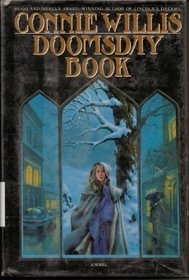Helpful Score: 15
This is one of the most inventive tales of time travel I've ever read. The plot is well-researched, giving an incredibly detailed history of The Plague. In addition, it addresses the sticky issue of paradox in a satisfying way.
Helpful Score: 8
A must read by a great author. She really studied her history for this one. I always enjoy her books, but I understand why this was a Nebula Award Winner. Dive into the 578 pages and enjoy this stunning novel. I would never part with this book, but some how I ended up with two copies.
Helpful Score: 5
n 2048, history student Kirvin decides to do an on-site study of fourteenth century life. Now, by 2048, time travel is possible so on-site means an actual trip back to the fourteenth century. It's a dangerous time: the black plague is scheduled to occur twenty years after the year for which Kirvin is scheduled. But guess what? Something goes wrong and Kirvin finds herself smack in the middle of this terrible plague anyway. What's a girl to do?
Connie Willis spent five years studying for her novel Doomsday Book and it shows. The description of the living conditions of the time will shock the reader. Willis also won both the Hugo and Nebula awards for this book, a rare feat.
This novel is already a SF classic and a standard on many "must read" lists of SF books. I know it's one of my favorites.
Connie Willis spent five years studying for her novel Doomsday Book and it shows. The description of the living conditions of the time will shock the reader. Willis also won both the Hugo and Nebula awards for this book, a rare feat.
This novel is already a SF classic and a standard on many "must read" lists of SF books. I know it's one of my favorites.
Helpful Score: 3
History and future wrapped in great writing. Experience vicariously the horrors of the Black Death, and discover how easily history might repeat itself. Kirvin and Dunworthy are well-drawn characters the reader begins to care about. Collin, a young boy swept up into both their tales, adds a atouch of humor and youthful exuberance that keeps things from becoming overwhelming. Not a "horror story," not a dry "history text" ... just two good stories that carry the reader along into what is imagination today, but might too easily be reality in the future.
Helpful Score: 3
I found this a bit darker than "To say nothing of the dog" but then again, this book is about the Plague. Written in a semi-serious tone, though, and there's an interesting parallel/contrast situation going throughout comparing the 14th century to the 21st. The impact really doesn't hit until after you finish reading. Without giving away too much plot, there are two pandemics, one the aforementioned black plague and the other a modern-day plague. It was saddening and a bit laughable that, in the modern-day scenario, you have a bunch of self-righteous bell ringers complaining about missing their concert, whereas during the Plague, the bell tolls meant something much more ominous. Anyway, this book has moments of irony, horror, humor and history. It's sci-fi "lite"!




